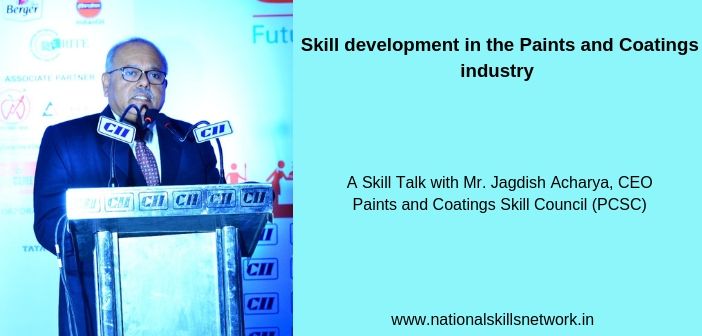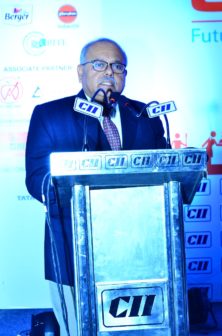“The paint industry in India has evolved rapidly from first factory, set up in Kolkata in 1902. It has created a unique space in the country’s industrial landscape, supporting rapid growth and advancement of various user industries such as infrastructure, automobiles, public transportation, agricultural equipment, consumer durables, chemicals and oil and gas. ” Adapted from PCSC website
Paints and Coatings sector was represented at the Skill East 2019 Summit by Mr. Jagdish Acharya, CEO, Paints and Coatings Skill Council (PCSC). We had an interesting conversation with him to learn more about the industry and the initiatives from Sector Skill Council in facilitating demand-driven training and ensuring quality and standards through QP – NOS and NSQF. Let’s read on…
The PCSC is a relatively new skill council, how is it helping the industry grow and what are the issues faced?
First, we are expecting paint industry to grow by about 8% to 10% so there is tremendous scope and opportunity in this industry. Second, the per capita consumption of paints is low in our country, so, not only the growth potential but there is huge scope for industry penetration as well.
When it comes to finding skilled human resources, it is a challenging situation, we need the necessary skills to fill the gap. There is also a skill gap when you compare with world standards. For example, if you want a repainting job to be done with minimum disturbance to the people who are residing there. Or, if it is a new construction project, then the expectation rises in terms of productivity and quality. In other words, painting needs to be done with as much productive output, least wastage, best practices in health and safety etc.
When we compare with world standards we have a long way to go in terms of following quality and standards. This also calls for upskilling as the workers would be already skilled or semi-skilled, they would have learnt on their own or traditionally they would have gone through a process of skilling.
Although we have institutes specialised in teaching paint manufacturing and paint technology, we have a scarcity of good skilling programs for paint manufacturing. There are certain job roles in paint manufacturing that need particular skills. For example, practical knowledge about the quality aspect and colour tinting are important.
 How are the training needs being addressed after the formation of PCSC?
How are the training needs being addressed after the formation of PCSC?
Keeping the industry requirements in mind, we put forward a proposal to NSDC to form a sector skill council along with industry partners. NSDC gave us the grant and we started in 2015. We have also invited the Indian Painting and Coating Association to join us, we hope to onboard them soon. In the last 3 years, we have developed 20 job roles, 9 of them are in manufacturing and 11 in application.
I would like to emphasize that when we talk about painting we only think of painting in the construction area but there are many types of painting jobs, for example, automotive paint, industrial paint, general industry paint, protective and marine paint and so on.
 We got one of the most important Qualification Packs (QPs) approved recently and we are in a good position to gradually enhance the number. We are contacting state skill development missions to carry forward various skilling programs. Recognition of Prior Learning (RPL) is another core focus area since painting is largely an informal sector.
We got one of the most important Qualification Packs (QPs) approved recently and we are in a good position to gradually enhance the number. We are contacting state skill development missions to carry forward various skilling programs. Recognition of Prior Learning (RPL) is another core focus area since painting is largely an informal sector.
First of all we want to bring in a sense of aspirational element. The Tamil Nadu State Development Commission has been very proactive they have supported us for RPL, we are also doing RPL 4 with existing industry partners. We are also conducting bridging courses, which are short 1 day or 2 day training courses. Short term training we are not able to do as it’s a challenge to do 240 hrs as painting is still not an aspirational job. We want to start with 1 to 2 weeks and slowly build it to longer duration courses.
We want to work with Odisha Skill Development Authority (OSDA) and ITIs to build specialized courses like protective and marine painting, automotive and decorative painting so they get value addition and get more salary too. In Bangalore and Chennai we are building Centres of Excellence. We want to combine and work with others, to some we say you give us a training centre and we will do the training, we are also doing NAPS and advocacy.
Tell us about the collaboration with the industry to meet the skilling demand?
Asian Paints is doing a lot of training through their colour academy already with NSDC though they are not involved with the sector. Berger paints, Nerolac paints, Nippon and some others are all doing it through the sector skills council, we are also working with small and medium companies and there is a plethora of them around 4000 to 6000 companies. There are mid to large size industries and we are focussing on them to conduct RPL sessions with them.
Except in construction and automotive skill councils there is no link with other councils and the paint and coating sector skill council can stand on its own but we would like to work with industry partners and ITIS and NSTI.
Paints and Coatings Skill Council (PCSC) – The road ahead
Our endeavour is to help the customers through our certifications. For this we are ensuring that the painters are trained and certified. If we say for a trouble free application use PCSC certified painters it will help in bringing up the standards of painting.For the painters we are trying to make it aspirational by training them in specialized painting areas like automotive and marine painting where they earn better and have a career path rather than being daily wage painters.













Comments 1